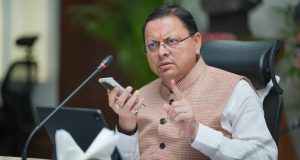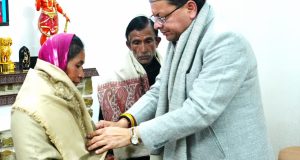DAINIK NATION BUREAU
Responding to the assertion of Union Law Minister Ravi Shankar Prasad that governance “must remain” with those elected to govern, Chief Justice of India (CJI) Dipak Misra categorically said that there can be no compromise on a citizen’s fundamental rights. , he said at a function organised by the apex court to celebrate Constitution Day, which was inaugurated by President Ram Nath Kovind.
The fundamental rights are the core of the Constitution. An independent judiciary with the power of judicial review has been conferred with the power of the ultimate guardian of the Constitution to strike a balance … to ensure that respective governments are functioning as provided by the law within their respective domains. There can be no compromise with the citizen’s fundamental rights.
“The citizens’ rights have to be at the pinnacle,” Justice Misra asserted. Calling the Constitution a lucid and living document, The apex court believes that we are only under Constitutional sovereignty and we shall practise it. Though no right was absolute, there should be no fetters which “destroy the central dogma of the constitution”, the CJI said.
Justice Misra said the focus of the judiciary should be on reducing pending cases, rejecting frivolous litigations and stressing on alternative dispute resolution mechanisms to settle cases.
Speaking at the function, Prasad said though PILs served the purpose in dispensing justice to the poor, they should not be used as a substitute for governance and the law-making powers of the executive and the legislature.
“PILs should not become a substitute of governance and the government because the founding fathers gave this right to those elected to govern. Law-making must be left to the realm of those elected to make the law, Prasad added.
“The founding fathers clearly meant that governance must remain in the realm of those elected to govern by the people of India and accountable to the people of India. While independence of the judiciary was important, judicial accountability, probity and propriety were equally necessary, he added.
In the case of the judiciary, the accountability is latent… Independence (of judiciary) is most important, but probity and propriety are equally important,” he said, while adding that “reckless allegations” should not be made or paid heed to.
Attorney General K K Venugopal termed a boon the evolution of the public interest litigation by the Supreme Court and said it had served poor citizens of the country. He referred to a judgement in a PIL that had led to the mass release of undertrial prisoners who had served the maximum jail terms prescribed for offences during the trial itself.
“It is one thing to deliver a judgement in a PIL but to implement it and to achieve results is a totally different thing. Therefore… there has to be collaborative effort,” he added.
“The government has to be given the opportunity to consider the various pro and cons. The government has to come forward with solutions. The government has to be heard what their budget allows,” he said.
He suggested that one or two special benches hear PILs and said there should be adequate guidelines to deal with the pleas. Moreover, there should be collaborative efforts on the part of the judiciary and the executive to ensure that the judgements are implemented keeping in mind the limited resources.
Referring to the humble background of President Kovind, Supreme Court Bar Association (SCBA) president and senior advocate R S Suri said it was the power of democracy and the Constitution that a person from a poor section of society had reached the very top.
nb-matter belongs to pti
 Dainik Nation News Portal
Dainik Nation News Portal




